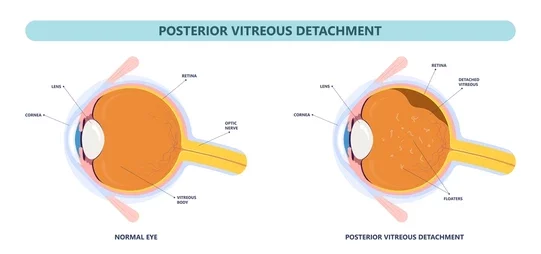Diagnose & Treatment of Eye Diseases
Flashes & Floaters

It is common for people to see small floaters from time to time. Especially when looking at a white background or at the sky. These occasional floaters are common and not a concern. The eye is made up of a gel known as the vitreous.
When you are born and young, the vitreous is solid gel-like, and as you age it liquefies and clumps together creating floaters and eventually the vitreous will degenerate, known as posterior vitreous detachment.
Posterior vitreous detachment (PVD)
Posterior vitreous detachment (PVD) is when the solid portion of the vitreous separates from the watery portion of the vitreous. PVD can be scary for patients, because they can have common symptoms like retinal detachment such as sudden onset of floaters (usually web-like) and peripheral flashes of light, which is caused by the vitreous bumping into the retina. The flashes usually go away after a few days. Peripheral vision is usually not affected, and the patient will have no pain and clear vision.
The majority of PVDs are benign and become less bothersome over time, and will notice less floaters. With advancing age, eventually everyone will have a PVD.

Call if you have a sudden onset
If you ever experience sudden onset of floaters or flashes of light, please call the office to be evaluated immediately.
Unfortunately, a small portion of PVD can contribute to a retinal tear, and thus later on cause a retinal detachment. There can be traction on the retina as the solid vitreous moves forward with PVD. The traction can lead to a retinal break. Other factors that can lead to retinal tears are retinal thinning disorders like lattice degeneration, blunt trauma, and nearsightedness. Retinal tears are treatable and to prevent future risk of detachment. Symptom of “shower of floaters” where you will see many dark spots, that is common with retinal tears.
Retinal detachment is a condition in which the retina separates from deeper layers of the eye. Blood supply of the retina will be compromised and usually vision loss will be experienced. Usually depending on the location of the detachment, a patient can lose only peripheral vision, or central vision if it involves the macula.
Signs of Flashers & Floaters
If you experience these 4 following signs, please call Thomas Eye Center immediately for evaluation.
- Sudden onset of floaters (web-like)
- “Shower of floaters”
- Flashes of light
- “Curtain effect”/peripheral vision loss
Risk Factors
- Nearsightedness (Myopia)
- Blunt eye trauma
- Peripheral retinal degeneration (lattice)
- Diabetic Retinopathy
- Cataract surgery
- YAG capsulotomy after cataract surgery
For LASIK Patients
We always remind our LASIK patients that their surgery was to treat their nearsightedness (myopia), and the laser only reshaped the surface of the cornea. It has no effect on the back of the eye, so the retina will still display characteristics of your original prescription, and still be nearsighted as before the surgery.
Myopic eyes are at higher risk for retinal tears and detachments due to the longer axial length and retinal thinning that occurs.
So if you had LASIK, you should still get your annual eye exam.
© Thomas Eye Center. Optometry, Family Eye Care, and Designer Eyewear in Athens, GA • Notice of Privacy Policy
